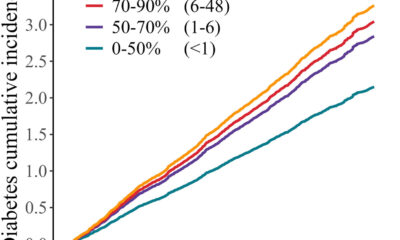Health
Poorer mental ability in teens linked to a tripling of stroke risk before age 50

Credit: CC0 Public domain
Lower levels of mental skills during the teenage years may be linked to a tripling of the risk of stroke before the age of 50, according to research published online in the Journal of Epidemiology and Community Health.
The observed associations held even when current diabetes was taken into account and the age of first stroke was limited to 40 years. This led the researchers to suggest that more comprehensive assessments beyond traditional stroke risk factors are now needed to prevent disability and death.
Recent evidence suggests that stroke rates are increasing among the over-50s. And about half of all stroke survivors can expect to live with long-term physical and psychological disabilities, the researchers say.
Lower levels of mental abilities in childhood and adolescence – including ability to concentrate, problem solving and learning – have been linked to higher risks of future heart and metabolic diseases. But the findings are inconsistent, the researchers note.
To strengthen the evidence base, they wanted to find out whether mental abilities during adolescence could be associated with an increased risk of early stroke in a nationally representative sample of 1.7 million young Israelis.
Before entering military service, 16-20 year old Israelis undergo an extensive evaluation to assess their suitability, and this study includes all people assessed between 1987 and 2012.
In addition to weight, blood pressure and current diabetes, other factors were also assessed, including education level, socio-economic background and mental abilities.
The latter includes tests to measure the ability to understand and carry out verbal instructions; verbal abstraction and categorization (word grouping); mathematical ability, concentration and conceptual thinking; non-verbal abstract reasoning and visual-spatial problem solving.
The study participants’ results were then linked to the Israeli National Stroke Database, for which mandatory reporting did not begin until 2014, until the end of 2018, the first recorded stroke or death, whichever came first.
The final analysis is based on 1,741,345 people, of whom 738,720 (42%) were women. Of the total, 12% (312,769) were scored as having a high level of mental ability, 70% (1,220,514) as an average level and 18% (208,062) as a low level.
Compared to those whose scores indicated high levels of mental ability, those at the other end of the scale were more likely to be overweight or obese (17% vs. 12%), and less likely to have completed a high school education (82% vs. 12% ). .99%), and are likely to have lived in a socially and economically disadvantaged neighborhood (35% vs. 19%) – all risk factors for cardiovascular disease.
Between 2014 and 2018, 908 cases of stroke were registered, of which 767 were caused by a blood clot (ischemic) and 141 by bleeding in the brain (intracerebral hemorrhage).
The mean age at first stroke was 39.5 years (maximum age 50 years). And 45 people died as a result (5% of all stroke cases), with almost two-thirds (62%) doing so within 30 days of the event.
Among those who scored low to average on mental ability, the incidence of both types of stroke was higher, especially that of ischemic stroke.
After taking into account potentially influential factors, people with low mental capacity were more than 2.5 times more likely to have a stroke before the age of 50 than people with high levels, while the risk of stroke in people with average level was 78% greater.
Of the 767 cases of ischemic stroke, 311 (41%) occurred before the age of 40 years. After taking into account potentially influential factors, this risk was almost double (96% higher) in people with an average level of mental ability and more than three times a year. times higher among those with low levels in their teens.
The increased risk increased along with the mental skills score, so that for every 1 unit decrease in the score (scale from 1 to 9), the risk increased by 33%. However, when the analysis was based only on mental ability categories, no such associations emerged for stroke with bleeding in the brain.
These associations persisted even after further in-depth analyses, taking into account current diabetes and limiting the age of first stroke to age 40.
This is an observational study and therefore cannot determine cause and effect. The researchers also acknowledge several limitations to their findings, including the lack of information on lifestyle, such as smoking, physical activity and diet; higher education; and several potentially important social determinants of health.
But they write, “Without intervention of risk factors in early adulthood, the risk of stroke accumulates.” They conclude: ‘Cognitive function may serve as a means to stratify individuals at greater risk for stroke and to intervene through potential mediators such as health illiteracy, education, and health-related behaviors.
“Providing early social and health care support to individuals with lower cognitive function may be essential to reducing their increased risk.”
More information:
Cognitive function in adolescence and the risk of early stroke, Journal of Epidemiology and Community Health (2024). DOI: 10.1136/jech-2024-222114
Quote: Lower mental capacity in teens linked to a tripling of stroke risk before age 50 (2024, June 27), retrieved June 27, 2024 from https://medicalxpress.com/news/2024-06- poorer-teen-mental-ability -linked.html
This document is copyrighted. Except for fair dealing purposes for the purpose of private study or research, no part may be reproduced without written permission. The content is provided for informational purposes only.











